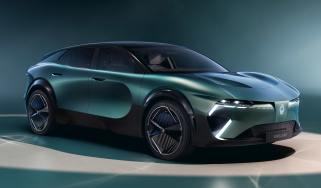The Renault Pro+ guide to electric vans (sponsored)
With low running costs and impressive cargo-carrying abilities, more businesses are choosing electric vans
The idea of an electric van isn't new, but it's one that's seeing growing interest from businesses looking to cut running costs and reduce their impact on the environment by switching from petrol or diesel.
Renault Pro+ is at the forefront of this new wave of electric van technology, with a range of 100 per cent electric products to support its bold vision of sustainable mobility for all. With London and other cities across the UK on the brink of introducing additional low emission zones, it's going to be harder for businesses to service these locations while keeping costs down.
Renault Pro+ is ahead of the game for companies that want to make the switch, courtesy of the New Renault Master Z.E. and the Renault Kangoo Z.E. 33.
Their electric powertrains deliver far lower everyday running costs, plus round-town performance that can match their petrol or diesel equivalents.
They’re not as expensive as you might think either, with the Kangoo Z.E. 33 only a small premium over the diesel version. Combine this with the potential savings in fuel and maintenance costs, and they really make a cost-effective choice for businesses.
With charging costing from 6.5p per mile for the Renault Master and 4p per mile for Kangoo, they could cost £4.81 and £2.96 respectively to travel the 74 miles between Manchester and York.*
Now think about what it would cost in your current van.
How the Renault Master Z.E. and Renault Kangoo Z.E. work
Both the New Renault Master Z.E. and Kangoo Z.E. 33 feature an electric motor under the bonnet, proving power directly to the front wheels - without the need for a manual gearbox. Power is supplied by a battery pack that sits further back.
Impressively, load volumes are the same as their diesel equivalents. That’s all down to the design of the battery pack, which is charged via a socket on the side of the New Renault Master Z.E. and in the nose of the Kangoo Z.E. 33. Think of an electric van like a smartphone, because it's better to keep the battery topped up by charging it whenever it's not being used.
With more than 18,000 public charging points across the UK, there’s likely to be one near you. Most charging is done at home or at depots, where the vehicles spend most of their dormant time - and where there are grants to help with the installation of infrastructure.
How do you charge an electric van
Simple. Just open the charging flap, plug the charging cable into the van and swipe your card to access the charge point. Then plug the cable into the chargepoint, and the van's on-board electronics do the rest.
You don't need to worry about leads coming out, or water getting into the system, because the charging cable is locked into the socket. All connections are waterproof, so you don’t have to worry about the British weather.
Charging time depends on the charger you use, but the New Renault Master Z.E. can take as little as six hours from a 7kW charger.
No compromise
Both New Renault Master Z.E. and Kangoo Z.E. 33 are available in a variety of sizes, and some versions of the Kangoo can carry an extra row of passengers. With payloads of up to 1,100kg for the New Renault Master Z.E. and 640kg for Kangoo Z.E. 33, most businesses won’t need to worry about being overloaded.
The electric motor gives the New Renault Master Z.E. a decent amount of power around town, and the battery has an official range of 124 miles for comparison purposes. In the real world, with a load on board, Renault claims a 74 mile range in the summer and 50 miles in the winter. For the Kangoo Z.E. 33, Renault claims an impressive summer range of 124 miles and winter range of 75**.
The differences in winter and summer range is due to batteries being less efficient in winter, storing less energy and releasing it less readily at lower temperatures.
The New Renault Master Z.E. feels much like any other big van to drive. Being electric, the standard automatic transmission, or more accurately ‘direct drive’, makes life easier too. A huge benefit of going electric is the limited engine noise compared to diesel. Outside the van, pedestrians are alerted by an audible tone.
Factor in a five year/60,000-mile battery warranty and 24-month/24,000-mile service intervals***, with cheaper servicing costs, and the financial benefits of running an electric van are as strong as they are for their environmental benefits.
If you’re a business looking to lower your running costs, or perhaps your business needs to adopt low tailpipe emissions vehicles, then you should visit your local business specialist at a Renault Pro+ Business Centre, or visit renault.co.uk/vans.
*Less than £5 full recharge cost, calculated by (a) electricity charges (e.on Go Online 1 Year v18) rates for payment via monthly Direct Debit as of Sept 2018) and (b) a full recharge of the 33kWh battery.
**Figures are obtained for comparative purposes in accordance with EU Legislation and may not reflect real life driving results.
***Whichever comes sooner. For full terms and conditions visit https://www.cdn.renault.com/content/dam/Renault/UK/brand-and-editorial/Aftersales/ZE-warranty-2018.pdf.
Find a car with the experts





